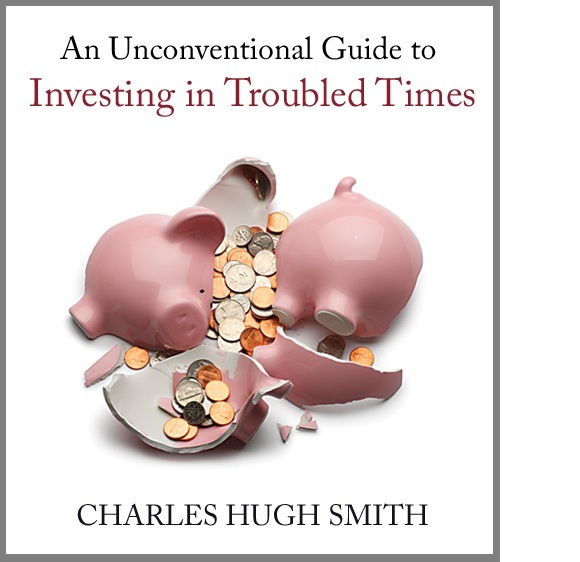Financial Cancer: Our Financial System Is Intrinsically Fraudulent and Unstable
Our financial system is like a fast-mutating cancer that evades any control and is still perfecting its ability to game and loot.
Two frequent contributors provided fresh insights into why the current global financial system will implode: it is intrinsically fraudulent and acts as a financial cancer, evading the "immune system" of regulation and perfecting its ability to exploit and loot the last remaining pockets of low-risk capital.
We start with David P.'s excellent exploration of systemic fraud:
Your essay The Collapse of Our Corrupt, Predatory, Pathological Financial System Is Necessary and Positive was entirely correct about risk. But let me come at this from a different angle - namely fraud.
Finance skims a percentage off the real economy. Some part of the skim is legitimate reward for capital allocation - a necessary part of a capitalist system and part of what makes it more efficient than a command economy. But some part of the skim is fraud.
Where are we now? Let's look at the sources of skim:
First there are the more legitimate skim sources - interest payments, management fees, IPO fees, M&A fees, trade commissions.
Then there are the less legitimate bank sources: penalty credit card interest rates, late fees, usage fees, over-the-limit fees, late payment fees, bounced check fees, low balance fees. And the capital markets sources - front-running, insider trading, account churning, manipulation of the news cycle, the captive analyst "ratings game", trading against your own client's order book, forex trades which are marked at the day high or low irrespective of when the trade took place, market manipulations at options expiration, stuffing your managed client accounts full of dubious IPOs and new issues that your organization is earning fees from originating.
Bucket shops and ponzi schemes take it even a step further - no actual financial activity takes place. Its simply robbery.
And now we add the new stuff: credit default swaps without margin, fraudulent loan origination, sliced & diced mortgages, mark to myth accounting, foreclosure halts to avoid realizing losses, extend & pretend, quote stuffing, HFT trading activity that boils down to denial of service attacks on exchange computers causing delays in pricing information, highly complex derivatives sold to unsuspecting but optimistic public servants, too big to fail status providing cheap backup in the event of trouble, and increased organizational size that facilitate cartel-like control over government and regulators.
But if that's not enough, there is the structure itself: they aren't doing this with saved capital, but rather with freshly printed and/or borrowed capital. Its all done with 12:1 leverage at a minimum. So only 8.3% of the gambling (optimistically anyway) is actual capital - saved surplus. And if Basel II says it's risk-free, well there's no need for reserves at all. It is just manufactured money, which effectively mean each bet is diluting the actual savings of real people. And if the bet goes bad, the Fed will ride to the rescue with low-cost money. But usually the bet goes well, because ordinarily the number of sources of fraud today is so HUGE, its practically impossible not to succeed.
Unless of course they get too greedy. Or the debt levels rise so high that large numbers of borrowers default. And guess where we are.
The financial system is supposed to allocate capital and take a modest skim as reward for helping society to be efficient. When they are doing this, they provide a net benefit to society because it's a win-win proposition. They are making society more efficient, and they thus earn their percentage.
However, and this is the key point: fraud provides no net benefit to society. Fraud extraction is a zero sum game. For every dollar extracted through fraud, someone in the productive society ends up losing - savings, salary, whatever. This is why fraud is bad.
(I say that leverage is zero sum because constructing money from thin air for a leveraged investment causes inflation and thus steals from savers.)
Currently, it is my opinion that the vast majority of today's highly profitable financial activity is fraud. They have gone way, way beyond their mandate of capital allocators. Because most of its activities are based on fraud, the finance industry is acting as a parasite, sucking the life blood from the rest of society. Its bad enough we have peak everything, a world population of 7 billion people, and globalization to deal with - but we also have to face these challenges while a leech is weakening us with every step we take!
As a result, when this bloated, fraud-based financial system dies, we'll have a awesome, positive chance to rip off the parasite and replace it with something more beneficial. Simply re-executing glass-steagall will do for a start. Bring back 9-3 boring banking, where banks retain the mortgage and live with the risk, and capital markets once again do their job of capital allocation -- but without the fraud so rampant today.
Same conclusion, different angle. Intrinsically, I believe that capitalism does actually allocate capital more efficiently than competitive systems. And yet, how the current system works is so wrong. And I figured out it was fraud. Fraud was the bad guy. Remove fraud, and things get a lot better.
But after re-reading your essay, fraud wasn't the whole answer either. Fraud might be the leech, but leverage is the system killer.
One other comment.
If you apply statistics incorrectly to market behavior, you get into trouble. It is possible to successfully hedge away risk if the failure of one investment is truly uncorrelated with another. Joe defaulting on his mortgage is a unique event, and won't affect Sam and the likelihood of him defaulting. Then you can apply statistics and things should work out fine. Of course, in a debt bubble or a recession, that's no longer true. The same factor that caused Joe to default will also affect the likelihood that Sam will default too. Unemployment, being underwater, herd behavior, "its better to rent" - it all correlates, completely destroying the underlying assumption. Real life trumps statistics.
This further supports your basic premise - in the real world, there are almost always hidden correlations that reveal themselves at the worst possible moment, typically at the point of maximum leverage. Thus for practical purposes, it is impossible to hedge away risk; as a result, leverage still kills.
We've seen this most recently in sovereign debt. Basel II lets banks lever to infinity on sovereign debt because it assumes sovereign debt has a zero default risk. Hmm...
So - remove fraud, remove leverage, admit risk will always exist, and the capital markets can go back to fulfill their traditional role in society of capital allocation, making us all more efficient.
But of course removing fraud and leverage removes all of the easy zero-sum profit opportunities; all that remains is the job of capital allocation. While its true that capital allocation materially contributes to society, it turns out it is also hard work. Who wants to do that when there's easy money to be made in fraud - with leverage! And that's why we have to have another crash so we can return finance to its proper - and necessary - role in society.
Contributor Michael M. explores the analogy that our financial system is in effect an aggressive cancer, and also explores the system's inherent instability:
I think the risk "hedging" can be split into two parts, first using/inventing "hedging" instruments who won't live up to their name in a major event (CDS anyone?), and second hiding risks in existing allegedly time-tested limited risk systems/instruments.
You mostly covered the first part in your article.
Some more examples for the second variant, besides lowering the down payment on house mortgages, are: Gaming VaR models (so for a 1% VaR the risk in the 99 days remains the same, but the blowup in the 1-out-of-100 event becomes much much larger), or lowering of Fractional Reserve requirements, or Sweep accounts (deposits in checking accounts get sweeped into savings accounts, i.e. are put into money market funds where the risk is a [little] bit higher, but the owner of the capital [the depositor] doesn't receive higher premiums), or student loans becoming non-dischargeable.
"So what happens when one counterparty (issuer of a hedge) somewhere in the chain runs into trouble? The entire chain collapses."
Or the accounting rules are manipulated, so the entity next in line after the collapsed one is allowed to keep their risk valued at par on the books, even though their hedge just vanished (and they are not able to get replacement hedges at an acceptable price in the current market) and the ongoing collapse freezes in a state of suspended reality - but the trouble is not undone!
The system has not blown up yet because there are still some pockets of unimpaired, really low-risk capital available to game and loot.
In effect the financial system is still perfecting its ability to game and loot, just like a cancer which, due to non-self-restrained growth and fast mutation, continuously improves its ability to elude or withstand the immune system. Until the host cannot bear the strain anymore.
How could we ever get to this point?
Too much stability. Thereby lowering reserves and safety margins more and more, until one day (maybe even without a large increase in volatility first!) a swing exceeds the safety margin. Oops. Which is exactly what Nassim Taleb is saying, but almost no one fully understands him.
This leads to my quote, which I came up with myself:
Stability breeds stupidity.
But at the same time one must remain humble of being able to overview all relevant parts of the picture... it can go on for a LOT longer than oneself can come up with a functioning game plan for, no matter how far you stretch your imaginable reality.
Which makes me go back to my "(over-)complexity" meme. I nowadays also look at The Fourth Turning through my complexity goggles... and war is still the strongest simplifier - quicker and more rigorous even than a systemic collapse!
Thank you, David and Michael, for your incisive analyses. The system's stability is superficial, and we might yet see that facade stripped away in the remaining months of 2011.
If this recession strikes you as different from previous downturns, you might be interested in my new book An Unconventional Guide to Investing in Troubled Times (print edition) or Kindle ebook format. You can read the ebook on any computer, smart phone, iPad, etc.Click here for links to Kindle apps and Chapter One. The solution in one word: Localism.
My Big Island Girl (song)
Buy from CDBaby or amazon.com (99-cent MP3 download)
Readers forum: DailyJava.net.
Order Survival+: Structuring Prosperity for Yourself and the Nation (free bits) (Mobi ebook) (Kindle) or Survival+ The Primer (Kindle) or Weblogs & New Media: Marketing in Crisis (free bits) (Kindle) or from your local bookseller.
Of Two Minds Kindle edition: Of Two Minds blog-Kindle
| Thank you, John R. ($50), for your phenomenally generous contribution to this site-- I am greatly honored by your longstanding support and readership. |




























